The World Health Organization recommends limiting the consumption of free sugars to 10% or less of total daily energy intake in order to lower the risk of dental caries and unhealthy body weight.
Some national dietary guidelines suggest lowering the intake of sugars from all sources in accordance with these recommendations.
However, these guidelines are based mainly on observational study data and do not differentiate between the sources of free sugars, making it difficult to identify the physiological mechanisms underlying any reported impacts.
“Our findings emphasize the importance of considering the source of sugars when looking at overall health effects,” said Toronto Metropolitan University’s Dr. Nick Bellissimo, the study.
In this randomized, repeated-measure research, thirty-six adult male and female participants with normal body mass indices drank one cup each of water, orange-flavored sugar-sweetened beverage, and 100% orange juice two hours after consuming cereal, 2% milk, and a breakfast bar for breakfast.
34 individuals had their subjective emotions, average appetite, and glycemic response assessed every 15 minutes for 60 minutes.
A continuous glucose monitor and food record were used to assess the rest-of-day glycemic response and calorie intake in 31 individuals.
Subjective pleasantness and sweetness were assessed right away following the ingestion of the test beverage.
For 60 minutes, measurements of the glucose response, average appetite, and subjective feelings were made every 15 minutes.
Sixty minutes later, at a pizza lunch, food intake was measured.
At 15, 30, and 45 minutes, blood glucose was lower after 100% orange juice than after the orange drink, but not at 60 minutes.
following drinking 100% orange juice, blood glucose levels over the remainder of the day were lower than those following an orange drink and water.
The results also demonstrated that when 100% orange juice was consumed instead of the orange drink, less food was consumed at lunch and during the rest of the day.
In comparison to the orange drink and water, the participants also expressed a greater subjective pleasantness index for 100% orange juice.
It may be possible to reduce total calorie intake throughout the day and help regulate blood glucose levels by switching from a beverage with added sugar to 100% orange juice.
Flavonoids like hesperidin, which are included in 100% orange juice, may affect how quickly sugar is absorbed by slowing down the transit of glucose, which would cause a delayed glycemic response.
Consuming only orange juice has been linked to higher levels of flavonoids, fewer added sugars, and better diets.
“Consumption of 100% orange juice as a preload resulted in higher caloric compensation, lower total daily energy intake, and lower blood glucose concentrations compared to the orange drink,” the researchers said.
“Future longitudinal studies are needed to assess whether the habitual replacement of sugar-sweetened beverages with 100% orange juice may contribute to healthier body weights and improved glycemic control.”
Topics #Blood Glucose #Orange Juice











